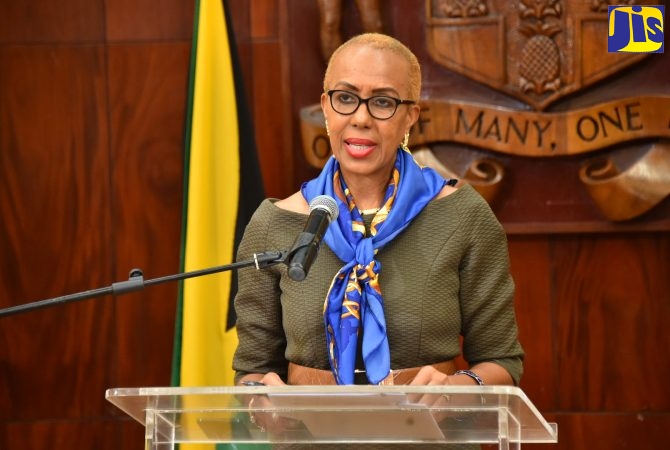Jamaica’s tertiary education sector has been in a state of modification and transformation over the past several decades says Minister of Education and Youth, Hon. Fayval Williams.
She noted that universities, community colleges, and teacher-training colleges and higher vocational institutions have been responding to demands wrought by changes in the economy and society at the national, regional and global levels.
“In their efforts to do this, many institutions are exploring new ways in which they can reposition themselves, by offering new programmes or more flexible delivery modalities, taking advantage of the possibilities offered by new technologies,” she stated.
The Minister was speaking during the United Nations Educational, Scientific and Cultural Organization (UNESCO)/Jamaica Tertiary Education Commission (JTEC) joint webinar, entitled ‘Beyond Limits: New Ways to Reinvent Higher Education’, on Wednesday (November 30).
Mrs. Williams said the Government, through the Ministry, has been implementing a strategic and integrated programme of education and training.
This, she informed, includes a standardised programme for the pre-primary to secondary levels, linked to tertiary education and skills training.
Coupled with this, the Minister added, is support for transitioning into the labour market on completion of secondary and/or tertiary-level education.
“Discussions, focused on improving critical components of the tertiary or higher-education sector, have been ongoing. This includes issues relating to increasing access, funding for students and institutions, and matters relating to the relevance of programmes within the context of the changing needs of the labour market,” Mrs. Williams said.
She noted that these discussions have been informed and shaped by best practices employed in other education jurisdictions.
The Minister further stated that there have been significant efforts over the years to establish a modernised governance framework for the oversight and management of the higher-education sector in Jamaica.
She cited the 2021 Report of the Jamaica Education Transformation Commission, led by Professor Orlando Patterson, which provides the impetus for current actions.
“Discussions surrounding higher education and training must, therefore, consider how the sector will ensure that programmes offered are intentionally designed to support the changing societal and labour market needs. This is particularly important given the continuing impact of COVID-19, climate change, global supply chain challenges, and inflationary pressures,” Mrs. Williams said.
Meanwhile, the Minister pointed out that Jamaica’s thrust to transform its higher education sector is driven by a number of critical goals.
These, she indicated, include widening participation in higher education, facilitating multiple pathways of access to higher education, enabling greater levels of learner success and completion, and strengthening the relationship between secondary and higher education to improve outcomes.
Other focus areas include ensuring appropriate and relevant legislative and regulatory frameworks; promoting a quality culture; integrating technical and interdisciplinary content and skills; leveraging resources within the education system to alleviate constraints; institutionalising flexible and agile administrative systems, processes and controls; contributing meaningfully to socio-economic development, and promoting internationalisation.
“We think that these are central to a modern system and drive processes that are agile and sustainable. We commend these to stakeholders across UNESCO’s regional and global networks,” Mrs. Williams said.
She added that the Government of Jamaica appreciates that a modernised higher education and training system will make a meaningful and telling contribution to continuous robust economic growth.


